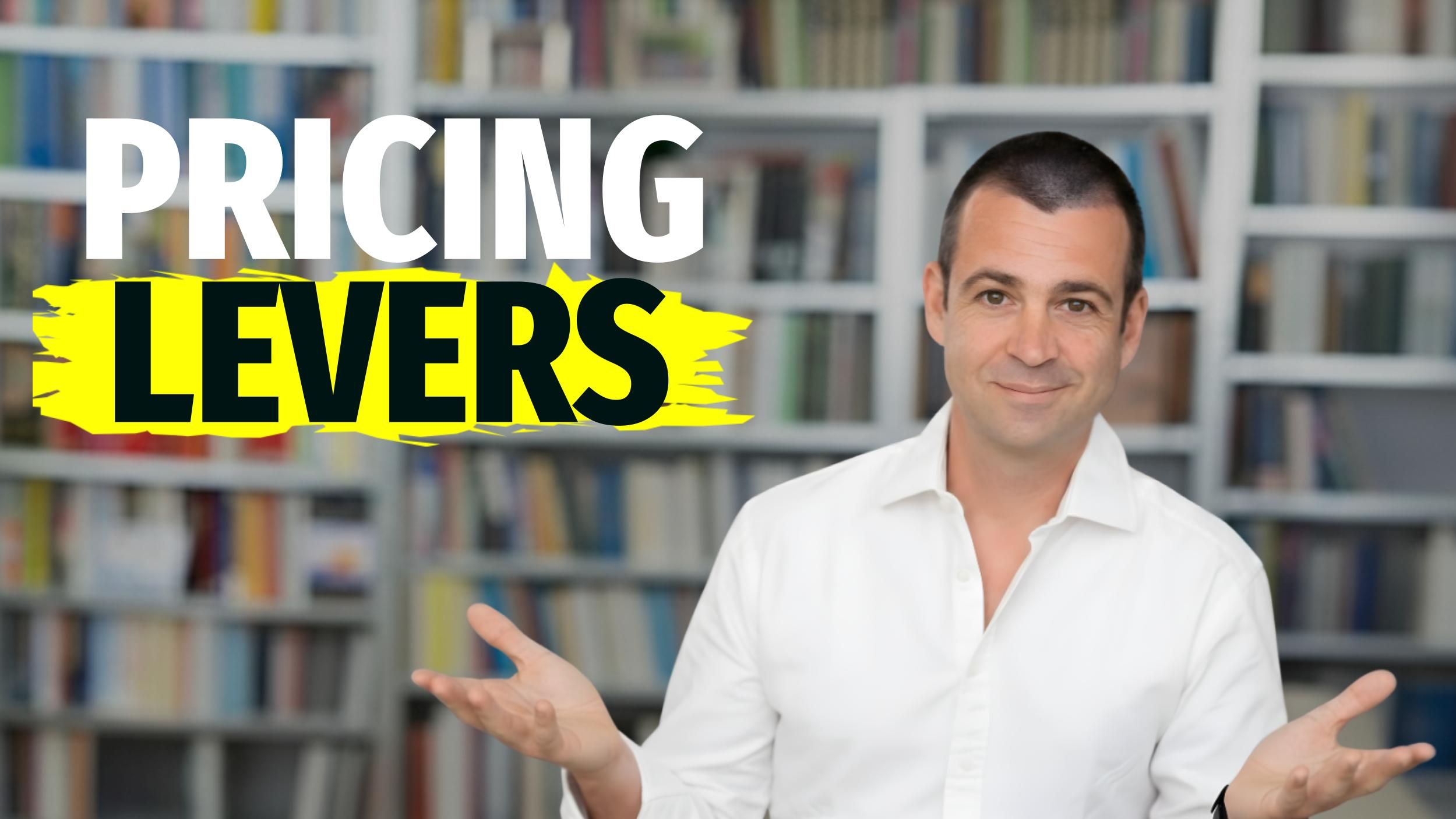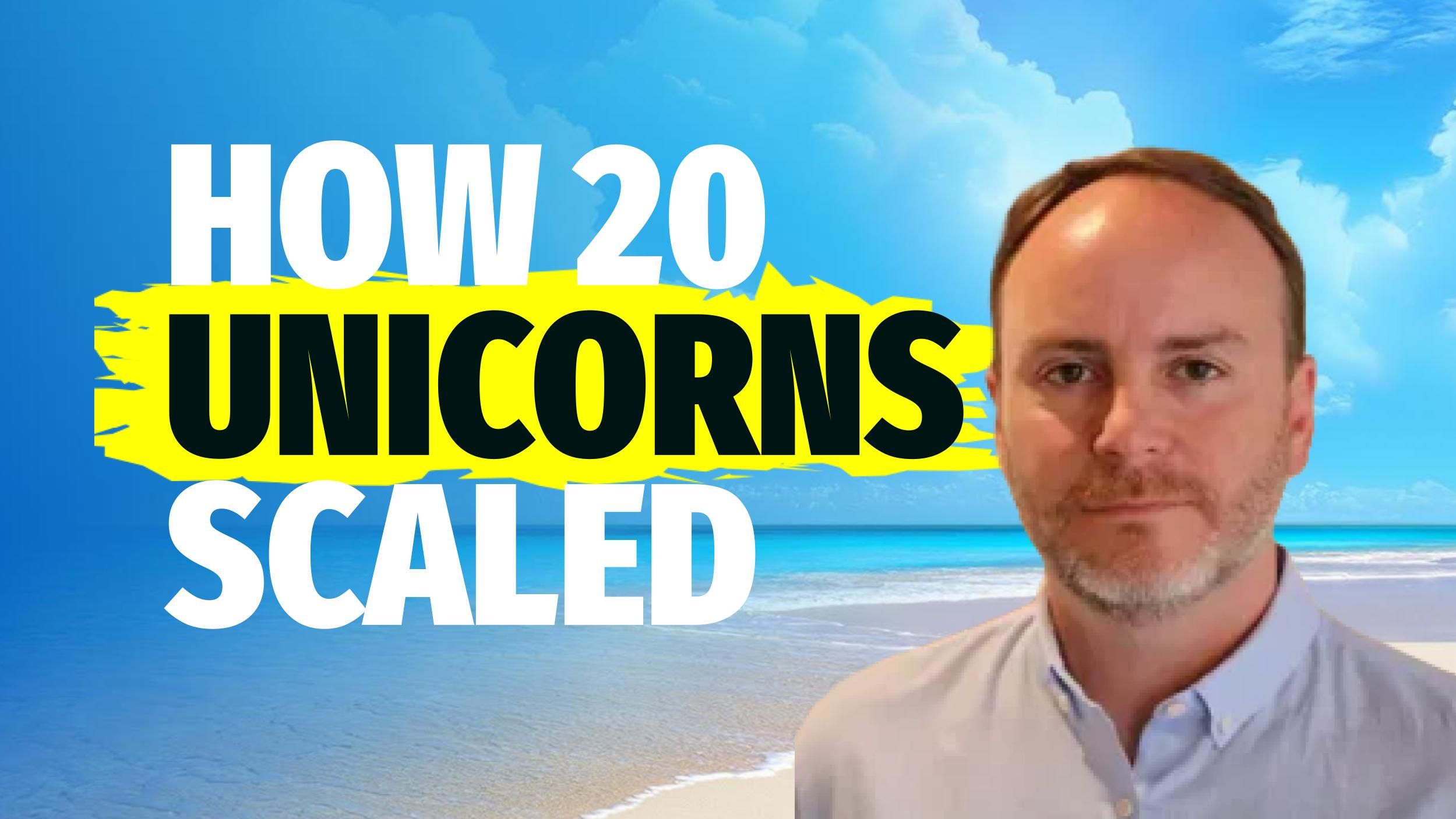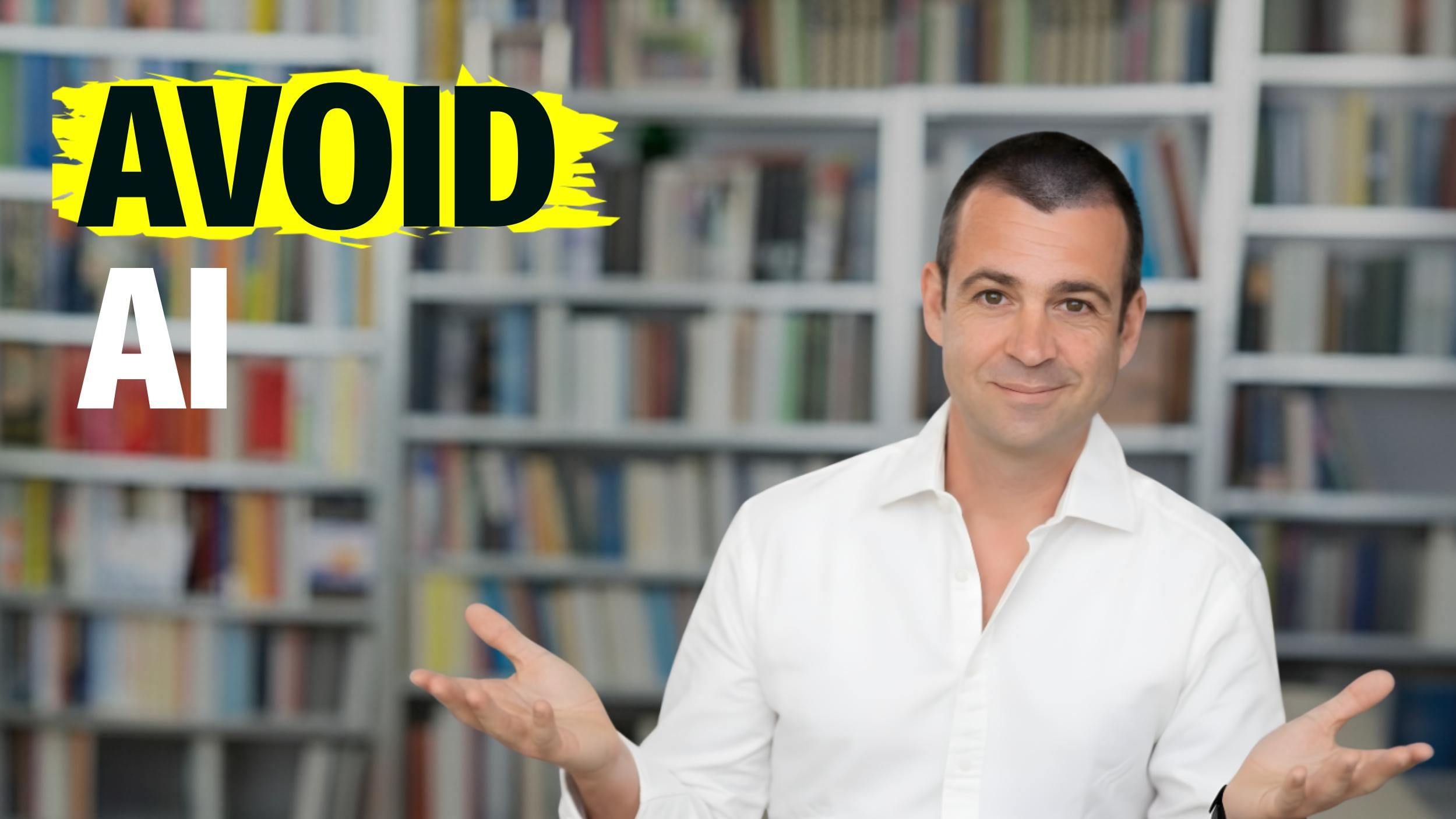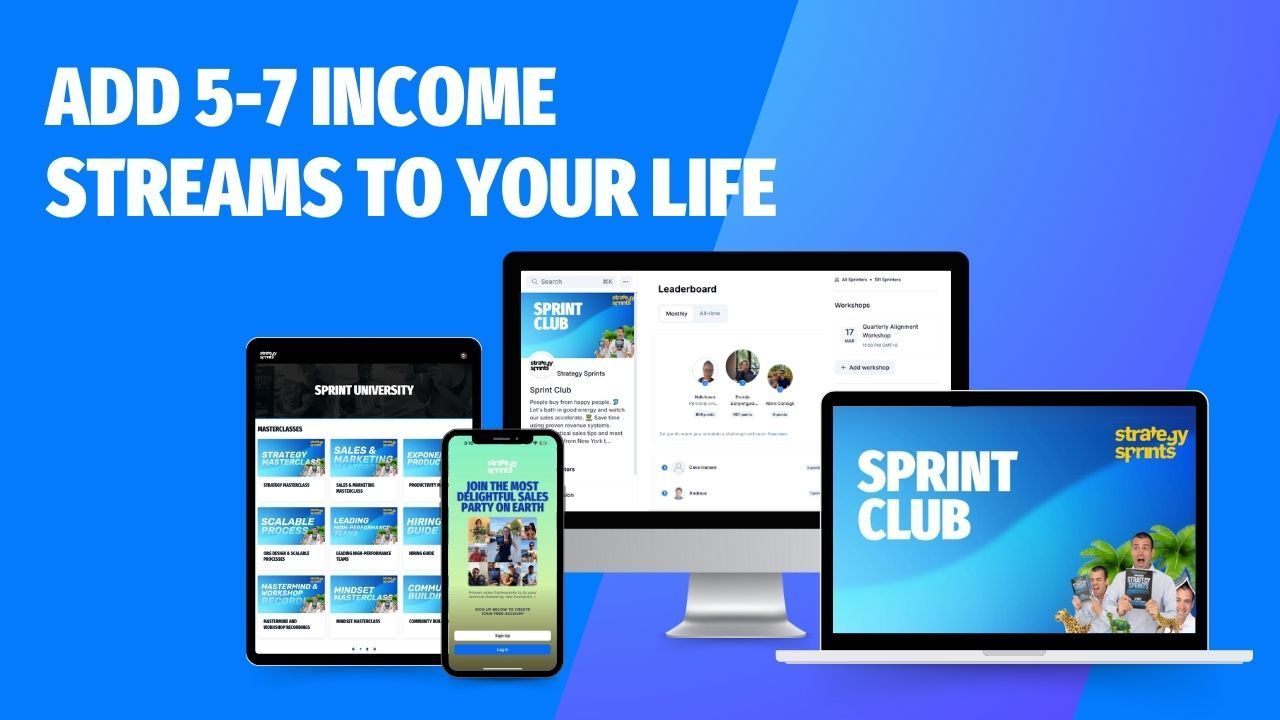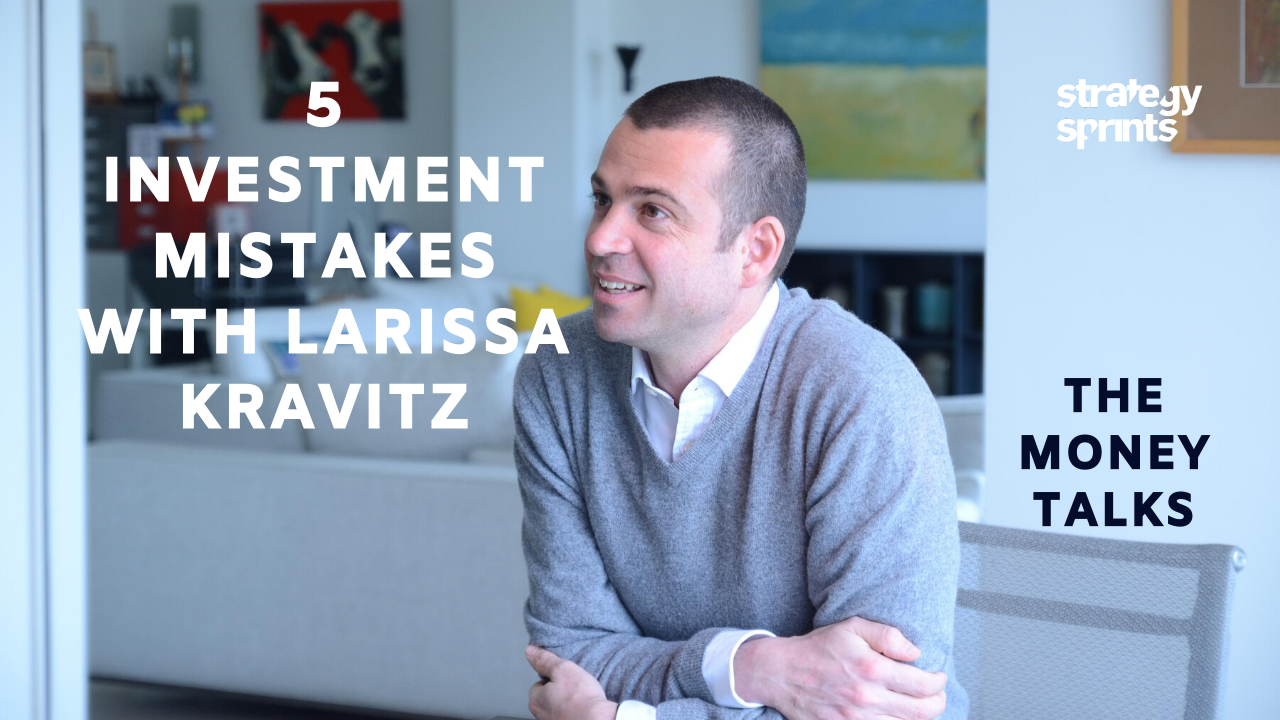
Avoid these 5 Investments Mistakes with Larissa Kravitz
Avoid these 5 Investments Mistakes
with Larissa Kravitz from Investorella
Check out our Podcast and YouTube Show episodes!
Larissa: Hello Sprinters! My name is Larissa Kravitz and today we will be talking about investments and finance as an entrepreneur. We'll look at the five biggest mistakes to avoid when investing as a private individual. We'll also talk about the do's of investing, not just as a private individual but also as a corporation. And how to structure finance within your company, be it a fast turnover software, or a service or a consultancy business. Also, how to structure your bank accounts, your cash flow, your liquidity, and everything that is important to financing the scaling and growth of your business.
Simon: Welcome everybody to the Strategy Show! I'm Simon Severino, your host and today we talk money with Larissa Kravitz. Larissa, is great to have you.
Larissa: Thank you, Simon. I'm really excited to be here and let's get started.
Simon: Would you like to introduce yourself to the audience?
Larissa: Of course, I am an investment advisor and corporate consultant. I used to be an equities trader, treasury manager, supervisory board member, risk manager and strategy developer in terms of financial trading strategies. I now do a lot of workshops on investment advice and financial literacy. I'm also a consultant for companies when it comes to their financing investment and treasury needs. I hope we can share a lot of wisdom today.
Simon: Yeah, and especially because money is such an important topic for everybody. We will talk both on the personal level and on the corporate level. And we will talk about what money mistakes to avoid, what are the correct money and investment strategies, and also you will give us advice on what the CEO, the founder, should do every week as a two-hour ‘Wealth & Investment Review’ which is wonderful. Let's start with the mistakes. What should we avoid?
Larissa: I would say these are the five top investment mistakes to avoid. The first one is: never invest in anything you don't understand. Let's say somebody offers you an investment and it sounds great it really sounds amazing. You can make an amazing profit in a very short amount of time but you don't actually understand how it works. Now this is something very dangerous because if you don't exactly understand the product or the deal then you have no way of evaluating the risks. and pretty much anything unexpected could happen simply because you don't really know what would normally happen or what would be likely to happen. It's very important to educate yourself about investing and the capital markets in general because that way you can avoid some of the most dangerous risks. That would be the first rule. There's a Chinese proverb that I really love about this and it basically says the best time to plant a tree was 20 years ago the second best time is now. The second one is basically about getting started with investment as soon as possible. Especially with entrepreneurs and entrepreneurial businesses what happens is that the entrepreneur or CEO says I'm going to start investing once I get that big client, once I sell my company and have this exit or once I pay myself the next dividend. Now, investing is something that should be done with the consideration of a 20-year horizon. So, you should actually be investing every month even if it's just smaller amounts.
Simon: I hear this a lot. Help me out. Some people say well if I start investing now, the amount is so small the leverage will be low. I should do it later because then the volume makes the leverage. So, that's not correct?
Larissa: The thing is that you do have compound interest so even if you start investing small amounts there's already interested accrues. The later you start the more you will have to invest. We do know that the future is uncertain. Let's say you do sell your company then you have a lot of money and instead of investing it, you start a new company with it. Then you might be putting that money at risk, that might be venture capital instead of solid investment for your retirement or for the future of your children. The other thing is when it comes to investment, knowledge and education is extremely important. If you start investing small amounts, you gain a lot of experience. This is why even if you are a freelancer or even if you just started a business and you don't even have employees yet, your business is tiny, it's a good idea to already start investment because you will learn along the way. Let's say you do the opposite, you build your company, you sell your company and then all of a sudden you have a lot of money on your hands and with that money you are a first-time investor. As a first-time investor you are very likely to make mistakes so then it's better to make this mistake with a few thousand euros rather than with a few million euros. Aside from the compound interest, that's one of the most important aspects of starting early. This is also why I suggest that parents talk to their kids about investment latest when their kids leave university or move out of the house. They should teach them basically to think about their future. Invest, even if it's just a small amount of money they’re putting aside, try to get started early because that will give them time to learn, to make mistakes, to compensate for these mistakes and also have compound interest accruing.
Simon: What else should we avoid?
Larissa; Another thing that should be avoided is excessive risk. A lot of people, especially in Europe if you look at the statistics and the research on why people don't invest in the capital markets the primary reason is because they're afraid of risk. They're afraid of the market crashing. They're afraid of losing all their money. The thing is that there are very simple ways of limiting your losses. Let's say you invest in securities and in the capital markets one of the simplest ways is something called a stop-loss order. So, when you buy stocks or you buy bonds the stop-loss order is an automatic sales order that will be triggered if the security price falls below a certain level. If you buy a security, then you could put the stop-loss level 10 or 12% below the current price, that way you will know that the security will be automatically sold if it falls more than 10%. You've kind of maximized your potential loss on that security. As a practical thing, let's say you went on holiday, you're hiking up Machu Picchu and there's no internet, you can't really use your phone. You're walking up there in the forest and all of a sudden there's some other tourists coming. They're walking down and you hear them talking to each other and about the markets yesterday, that was an absolute bloodbath, can't believe they fell so much in a day. This is a very practical reason to have stop-loss orders. They're automatic and you don't really have to worry about them. In case there is some kind of flash crash or the markets just crash right when you are not at your computer or somewhere where you can trade, then your loss will be cut automatically. That’s a very good risk management strategy
Simon: Talking risk, let's dive into an everyday topic. 99% of my friends invest in real estate. They buy the apartment or the house they live in. 99% of the educated population think this is the best way to do it. Now I'm not an expert, but I thought that diversification means that you put 15% to 20% in real estate of your full portfolio. Usually when they do it in their 30’s, it’s around 90% of their investment portfolio. Is it really still the right thing to do from an investment perspective? Or are we just repeating the patterns of older times?
Larissa: I do think real estate investing is important. I think it's one of the best ways to secure your retirement. If you look at poverty in retirement, rental payments are one of the major driving forces of old age poverty. It's a very good idea to take care of that real estate problem while you're young. Normally you will only invest 20 or 30% that’s basically to make a down payment of 20-30% on the real estate you buy and then have a mortgage over 20, 30 years. So, you wouldn't necessarily count the price of the real estate towards your portfolio value, but only the equity. Basically it’s the down payment you've made and the equity that is accrued by you paying back your mortgage or by the price of the property rising. So it wouldn't necessarily be 90% if you also invest in securities. It is a good idea to diversify in the sense that your real estate is not your only asset or barely your only asset being 90-95%. One of the things that I like is the idea of actually buying smaller real estate units as rental units and if you have a bigger family actually not buying but renting the apartment that you live in. This is something that a lot of people that I know actually do because the bigger the apartment gets the lower the rent per square meters. Especially in urban areas where you have a lot of single households. You have the classic 40 to 50 square meter apartment which actually has a very high rent per square meters but once you get up to family size apartments 120, 150, 200 square meters the rent per square meter actually starts to fall again. To a certain extent, it can make sense to say okay I'm going to invest in smaller units that I rent out and my family unit is actually something I'm going to rent instead of buy. That's one way to go about it as well. I'm actually a fan of real estate investment. I used to work in real estate as well, for real estate companies. As a private individual, I think it's one of the best ways to secure your future, not only financial freedom but peace of mind as well. Even if you start out with a small property, say you're young, you're 25 or you barely 30, you have your first job I think it's always a good idea to buy a small apartment and then gradually upgrade and not necessarily wait too long to buy something super huge.
One of my best friends bought a very small apartment in his late 20s. It was really something that you would call a bit of a substandard apartment. It was in a not very popular location. He had to refurbish it,make it really nice. Him and his wife have two children and this is a rather small apartment. Instead of doing what most families do when they have kids and upgrade and start renting a very expensive place immediately, they decided to kind of use their space efficiently. The children were sharing a room and they managed to save a lot of money. Now they managed to buy the apartment next to it and are connecting the two apartments and will have a huge garden maisonette actually. And they have a lot of savings so they don't have to take on a lot of debt, it’s compounded over the years. That's also one of the things is if you want to get on the real estate investment ladder, it's a good idea to start with something small and affordable rather than going out and always rental upgrading every time you move in with somebody or you have a child. It's a good idea to essentially sacrifice the present for the future a little bit. Because in the case of that family, they now have a lot of freedom. They have two jobs. They have a very cheap mortgage because they've managed to save a lot of money over the years by not upgrading immediately.
Simon: What else should we avoid? Before we go to what we should do.
Larissa: I think one of things to avoid is hypes. Essentially when it comes to securities investment or capital markets or general even with real estate don't be upset when you've missed an investment. there's no such thing as missing an investment. It's like a train station. There will be another one along in five or ten minutes. There are always new trends starting, there are always interesting opportunities. Especially in the capital markets, if you feel you've missed an entry point it might not necessarily be a good thing to run after that security and buy it at a very high price. You might want to wait until the next really good opportunity shows up. That's also one important thing. The other thing is to really do your analysis. Look at investment as a 20 a 30 year project. Very often you might be talking to people about investment or people might talk to you about a certain security, about a stock, about a company, they might give you their personal opinion they may be wrong. Sometimes people try to give you insider information you should definitely not act on that it's illegal. You should always do your own research and really educate yourself about investing in finance. Do your own research. Don't try to make a lot of money quickly. Try to make a good return slowly, but consistently over the time span of 20 years.
Simon: Thank you so much.
Keep Rolling
Simon Severino, CEO Strategy Sprints GmbH
P.S. Entrepreneurial freedom is awesome. It’s also a lot of hard work to get there. And when you are there, it is easy to lose your grip. Our community of 16.000 entrepreneurs is getting stronger and stronger every week, because we amplify each other. We share what works, and drop the rest. We test, refine, improve. Check strategysprints.com to level up your business and have fun doing it.
Get our expert sales tips delivered
By submitting you agree to receive our weekly Strategy Sprints Newsletter as well as other promotional emails from Strategy Sprints. You may withdraw your consent at any time via the “Unsubscribe” link in any email or view our privacy policy at ant time.


